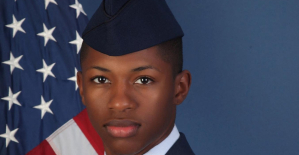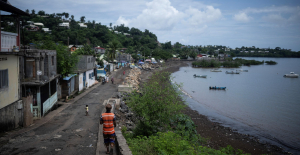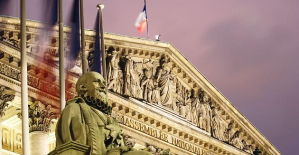The great Guadeloupean novelist Maryse Condé died on the night of April 1 to 2 at the age of 90, in Apt, in Vaucluse, after a life of humanist struggles. A constant fight against racism and discrimination. Through around thirty books, she has told the history of Africa, the legacy of slavery and black identities. The Élysée announced Friday that Emmanuel Macron would pay him a national tribute on April 15, on the site of the National Library of France (BNF). e
The choreography is immutable: with a formal approach, the president steps forward, then speaks, in a serious tone. Emmanuel Macron, has developed a tropism for commemorations and tributes, a way of invoking a Nation brought together in times of fractures, and of sketching, implicitly, his own political project.
The Head of State went on Sunday April 7 to the Glières plateau, the Alpine theater of battles between the German army and the French militia against the resistance, then to the house in Izieu, in Ain, where 44 children and seven educators, all Jews, were rounded up on April 6, 1944 and then deported. This was the kick-off to the commemorations of the 80th anniversary of the Liberation, of which the ceremonies on June 6, in memory of the Normandy Landings, will be the high point. An obligatory meeting, but one that Emmanuel Macron will mark over the year to make it a highlight of his second five-year term.
“Unquestionably”, there is a “memorial tropism” in this forty-year-old president, notes the historian Jean Garrigues. “A taste for history and memory”, “a tendency to exalt heroic figures” which results in “an increase in commemorative events”, he says. It was from the presidency of François Hollande that the number of tributes paid each year increased significantly (eight in five years).
Already 25 national tributes paid to personalities, 28 including national tributes to French victims of terrorism. Maryse Condé will be the 26th personality. To Charles Aznavour or Jean-Paul Belmondo, to the resistance fighter Léon Gautier or to the former president of the European Commission Jacques Delors, to the feminist lawyer Gisèle Halimi or to the father of the abolition of the death penalty Robert Badinter. But also to everyday “heroes”, like gendarme Arnaud Beltrame, killed by a jihadist to whom he had surrendered to save a hostage during the Trèbes attack.
“It is the president who buries the second part of the 20th century,” slips an advisor to Emmanuel Macron to justify these repeated meetings in the Court of Honor of the Invalides – or in a symbolic place for the deceased. Under the leadership of the influential “memory advisor”, Bruno Roger-Petit, these ceremonies are an opportunity for crafted speeches, chanted with a voice from beyond the grave, to lyrically retrace a life journey. The style asserted itself as the temples of the youngest President of the Republic whitened.
But it was in the making from the evening of his election in 2017, during a long solemn and solitary march towards the Louvre Pyramid to the rhythm of the European anthem. Subsequently, the invention of a “memorial journey” for the centenary of the end of the 1914-18 war confirmed its appeal for the exercise. “Even before he came to power, the president said that he wanted to reconnect with the tradition of celebrating French heroes,” explains a source. Another explains this doctrine: “Memory is the cornerstone of the imagination which constitutes us as a Nation.”
Emmanuel Macron also chooses to include personalities in the Pantheon, such as Simone Veil, Joséphine Baker or Missak Manouchian, or to emphasize certain anniversaries supposed to resonate with the present or with his own leitmotif, "at the same time" of right and left. “Napoleon Bonaparte is a part of us,” he says in 2021 for the bicentenary of the emperor’s death. Georges Pompidou is celebrated for his “modernity of conquest”, who “thought of both Old France and New France”, while Georges Clemenceau, “Father of Victory” of the First World War, “inspires him enormously” for his refusal of “defeatism”.
If his entourage assures that he “always avoids” “talking about himself through the honored person”, the head of state nonetheless assumes a political message. Through the 80th anniversary of the Liberation, it should recall a time when the French waged war among themselves, before reconciling.
For Jean Garrigues, this “tropism” is explained in particular by Emmanuel Macron’s “difficulty in embodying the people he governs and who elected him”. “He seeks figures in the past of the Nation to fill this void”, in a form of “incarnation by delegation”, estimates the historian, while emphasizing that these moments can appear “disconnected from the daily reality of society French.
Communicator Emilie Zapalski wonders if the president has not finally “found his place” in this ceremonial, while “it is more and more difficult for him” particularly on the national scene, where he is deprived of a majority absolute in the National Assembly and sees the race for his succession opening before his eyes. The memorial, “it’s a bit of his best role,” she says, even if she pinpoints, in form, an “Emmanuel Macron who watches himself do and hears himself say.”

 Germany: a new research operation will be launched for a 6-year-old autistic child
Germany: a new research operation will be launched for a 6-year-old autistic child Gaza: under the spotlight, the Israeli-Palestinian conflict shakes up the Eurovision contest
Gaza: under the spotlight, the Israeli-Palestinian conflict shakes up the Eurovision contest Black soldier killed by a police officer in the United States: the sheriff publishes the video of the arrest
Black soldier killed by a police officer in the United States: the sheriff publishes the video of the arrest In Malmö, the Eurovision party transformed into entrenched camps
In Malmö, the Eurovision party transformed into entrenched camps “Mediterranean diet” or “DASH”, two good tips for eating better
“Mediterranean diet” or “DASH”, two good tips for eating better Fatal case of cholera in Mayotte: the epidemic is “contained”, assures the government
Fatal case of cholera in Mayotte: the epidemic is “contained”, assures the government The presence of blood in the urine, a warning sign of bladder cancer
The presence of blood in the urine, a warning sign of bladder cancer A baby whose mother smoked during pregnancy will age more quickly
A baby whose mother smoked during pregnancy will age more quickly Climbing the steps, stars, evenings… “Gala” is available daily during the Cannes Film Festival
Climbing the steps, stars, evenings… “Gala” is available daily during the Cannes Film Festival The closure of MA France marks the end of the automobile industry in Seine-Saint-Denis
The closure of MA France marks the end of the automobile industry in Seine-Saint-Denis Satellifacts, daily newspaper specializing in audiovisual, acquired by the financial news media CFNews
Satellifacts, daily newspaper specializing in audiovisual, acquired by the financial news media CFNews First stop to Chinese solar panels
First stop to Chinese solar panels Léa Seydoux at the heart of a new project by Leos Carax
Léa Seydoux at the heart of a new project by Leos Carax The general director of the Picasso Museum soon to head the Lyon Biennale
The general director of the Picasso Museum soon to head the Lyon Biennale Sylvie Pialat replaces Sorogoyen at the head of Critics’ Week
Sylvie Pialat replaces Sorogoyen at the head of Critics’ Week Jazz: death of famous guitarist Christian Escoudé
Jazz: death of famous guitarist Christian Escoudé Omoda 7, another Chinese car that could be manufactured in Spain
Omoda 7, another Chinese car that could be manufactured in Spain BYD chooses CA Auto Bank as financial partner in Spain
BYD chooses CA Auto Bank as financial partner in Spain Tesla and Baidu sign key agreement to boost development of autonomous driving
Tesla and Baidu sign key agreement to boost development of autonomous driving Skoda Kodiaq 2024: a 'beast' plug-in hybrid SUV
Skoda Kodiaq 2024: a 'beast' plug-in hybrid SUV The home mortgage firm rises 3.8% in February and the average interest moderates to 3.33%
The home mortgage firm rises 3.8% in February and the average interest moderates to 3.33% This is how housing prices have changed in Spain in the last decade
This is how housing prices have changed in Spain in the last decade The home mortgage firm drops 10% in January and interest soars to 3.46%
The home mortgage firm drops 10% in January and interest soars to 3.46% The jewel of the Rocío de Nagüeles urbanization: a dream villa in Marbella
The jewel of the Rocío de Nagüeles urbanization: a dream villa in Marbella LFI: Manon Aubry places social issues at the center of her European campaign
LFI: Manon Aubry places social issues at the center of her European campaign Diving into the secrets of the National Assembly
Diving into the secrets of the National Assembly Institutions: senators want to restore the accumulation of mandates and put an end to the automatic presence of ex-presidents on the Constitutional Council
Institutions: senators want to restore the accumulation of mandates and put an end to the automatic presence of ex-presidents on the Constitutional Council Europeans: David Lisnard expresses his “essential and vital” support for François-Xavier Bellamy
Europeans: David Lisnard expresses his “essential and vital” support for François-Xavier Bellamy These French cities that will boycott the World Cup in Qatar
These French cities that will boycott the World Cup in Qatar UNFP Trophies: Éric Roy (Brest) voted best coach of the season in Ligue 1
UNFP Trophies: Éric Roy (Brest) voted best coach of the season in Ligue 1 “The love I have for PSG is sincere”: Kurzawa announces his departure from the club
“The love I have for PSG is sincere”: Kurzawa announces his departure from the club Ligue 1: Marquinhos, Mbappé, Aubameyang... The typical team of the season
Ligue 1: Marquinhos, Mbappé, Aubameyang... The typical team of the season UNFP Trophies: Kylian Mbappé wins a fifth consecutive title as best player of the season
UNFP Trophies: Kylian Mbappé wins a fifth consecutive title as best player of the season


















